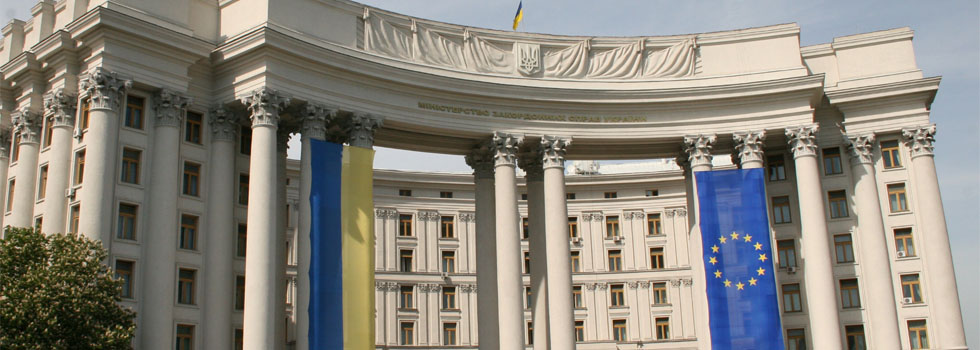
Following the resolution of Parliamentary Assembly of Council of Europe 2141 (2017) “Attacks on journalists and media freedom in Europe”, adopted on 24 January 2017, and the statement of the OSCE Representative on Freedom Media Dunja Mijatovic, Ministry of Foreign Affairs of Ukraine expressed the following position (translated by Embassy of Ukraine in Australia ).
Military aggression of Russia against Ukraine caused the continued deterioration of media freedom and safety of journalists on illegally occupied territory all the civilized world is worried about. The situation in Ukraine reflects the new face of hybrid war as well as common concerns in deteriorating situation of press freedom in Europe, caused by Russian actions.
The last confirmation of the high level of concern as a result of military aggression of Russia against Ukraine, was Resolution of Parliamentary Assembly of Council of Europe, 2141 (2017) “Attacks on journalists and media freedom in Europe”, adopted on 24 January 2017 and the statement of the OSCE Representative on Freedom Media Dunja Mijatovic, released the same day. In particular the PACE paper reflects the deteriorating situation of press freedom in Europe with the special attention of the egregious violations of human rights and fundamental freedoms in the occupied territories of Ukraine – such as the Crimea and occupied parts of Donetsk and Lugansk regions, where, in particular, continuing suppression of freedom of the media and journalists remain among the most vulnerable expressions of repression by the Russian occupation authorities. The document contains the request of the Parliamentary Assembly of the Council of Europe to the Russian authorities immediately release the Ukrainian filmmaker Oleg Sentsov and journalist Roman Sushchenko, and stop prosecution of journalists Anna Andrievska, Natalie Kokorin and Nicholas Semena in the occupied Crimean peninsula on trumped charges of “separatism” as well as stop pressure on Crimean Tatar minority media.
OSCE resolution condemned the repressive practices of the occupation regime in the Crimea and Donbas. In particular, it criticized restrictions on access to information, pluralism and the worsening security situation of journalists. International organizations demand from the Russian Federation as an occupying state-immediately cease violations of human rights and fundamental freedoms, including the freedom of media in the occupied territories of Ukraine.
On 24th January 2017 PACE has welcomed Ukraine’s ambitious reform programme, stressing that “much progress has been achieved” in changing the legal framework needed for the reforms – but warned that progress on combating corruption was still “too slow”.
Debating the functioning of democratic institutions in Ukraine, based on a monitoring report by Jordi Xuclà (Spain, ALDE) and Axel Fischer (Germany, EPP/CD), the Assembly warmly welcomed, in particular, the priority being given to constitutional reform. Read Adopted Resolution .
However, the parliamentarians also expressed concern at a “hardening political discourse” and polarisation and tensions in the media environment. They also called for changes to the election law, as well as the continuation of an “inclusive policy” towards minority languages.
The growing tensions in Ukrainian media environment were also condemned in the latest Report of the Chief Monitor of the Special Monitoring Mission to the OSCE Permanent Council. On 19 January OSCE Chief Monitor, Ambassador Ertugrul Apakan, among other issues, highlighted in his address to the OSCE Permanent Council several developments which continue to limit freedom of expression and freedom of the media in areas not controlled by the Ukrainian government, including a ban of over 350 websites and continued restriction of access to Ukrainian media outlets, both in print and broadcast. Particularly worrying, the Representative noted, is the continued threats and intimidation of media workers, as well as the arrests of bloggers Eduard Nedelyaev and Gennadiy Benitskiy by “LPR” members.
“Access to information, plurality of opinion and the safety of journalists continue to suffer in times of crisis,” Mijatović said. “As is the case in Crimea, the ongoing deterioration of free expression and free media in conflict-affected parts of Ukraine is deeply disturbing.”
In addition, the Representative expressed concern once again regarding the persecution of Crimean journalist Nikolay Semena from the Krym-realii online media outlet. According to reports, on 20 January Semena was indicted for “public calls for actions violating the territorial integrity of the Russian Federation.” The indictment follows the publication of an article, written by the journalist, expressing his views on the status of the peninsula. If convicted he faces up to five years in prison.
“The case of Semena reminds us all of the arbitrary practice of silencing critical voices in Crimea,” Mijatović said. “It is totally unacceptable to persecute the journalist for expressing his views. I call for all charges against Semena to be dropped.”
“I once again call on all those responsible for law and order in these areas to stop the destruction of freedom of the media and do their utmost to ensure the safety of journalists,” Mijatović said.
Mijatović added that it is difficult to give a comprehensive assessment of the current state of affairs of media freedom and to engage with journalists in conflict-affected parts of Ukraine and in Crimea, due, primarily, to a number of access and security obstacles.
The Representative has repeatedly expressed concern about media freedom violations in Crimea and the conflict-affected parts of eastern Ukraine, particularly highlighting attacks on journalists and media outlets, as well as the blocking of Ukrainian broadcasting channels and their illegal replacement with state broadcasters from the Russian Federation (see www.osce.org/fom/118990, www.osce.org/fom/143861, www.osce.org/fom/234691, www.osce.org/fom/121673 and www.osce.org/fom/144931).
Official sources: Parliamentary Assembly; OSCE and Ministry of Foreign Affairs of Ukraine


